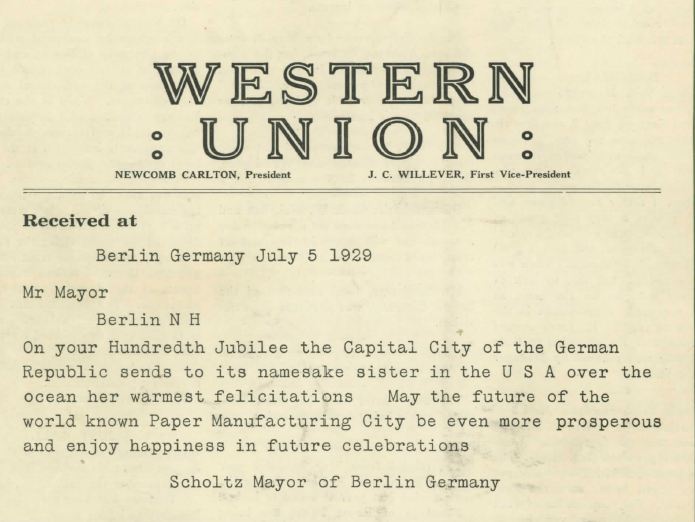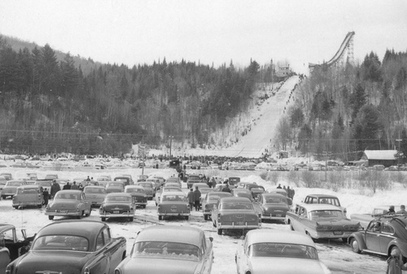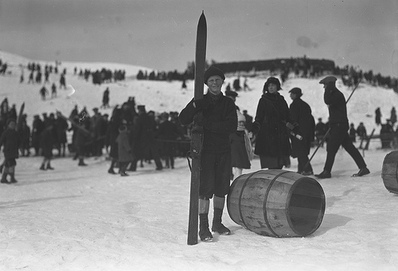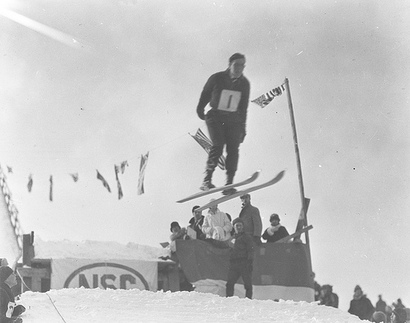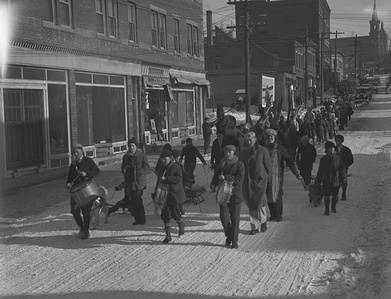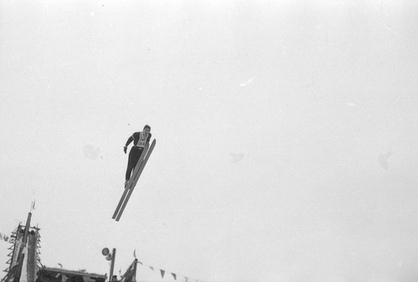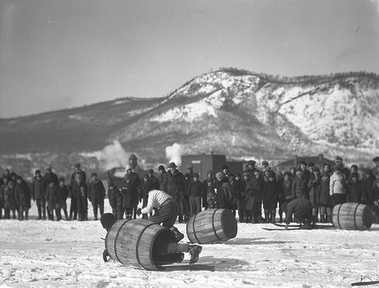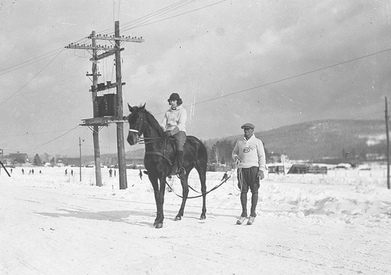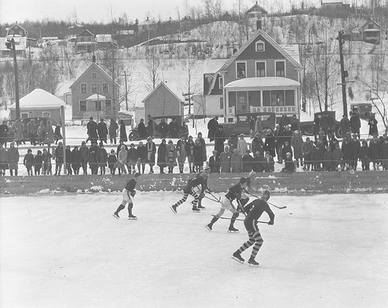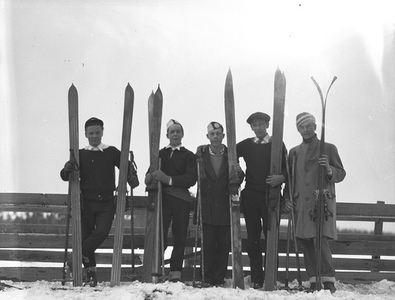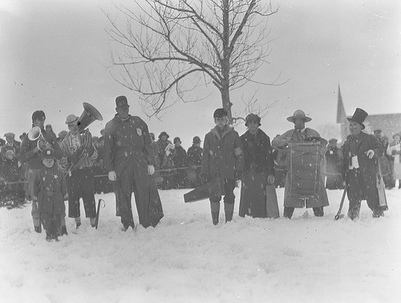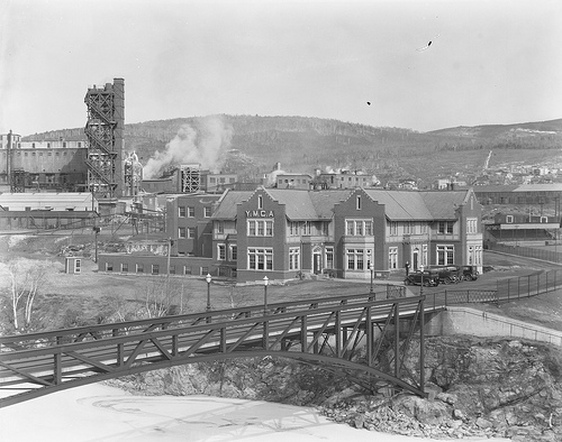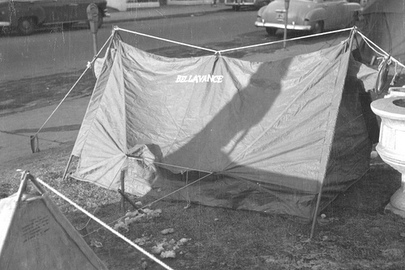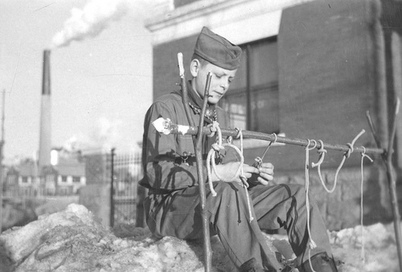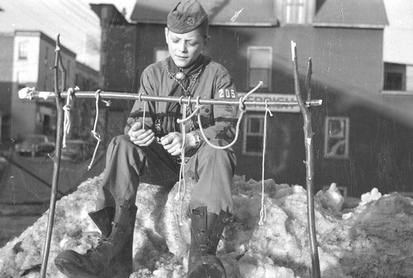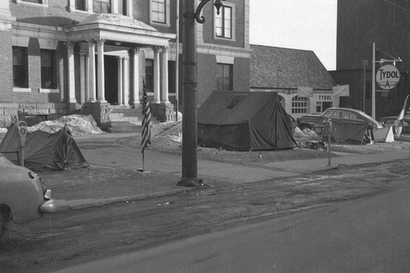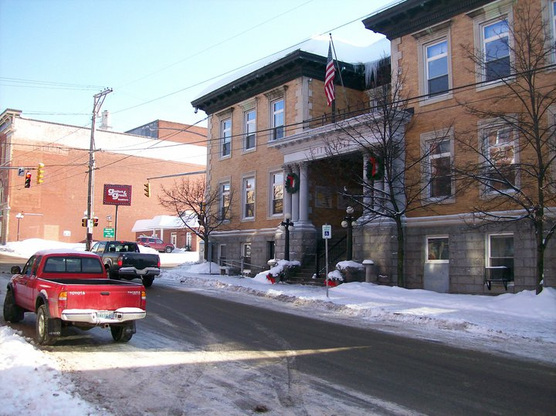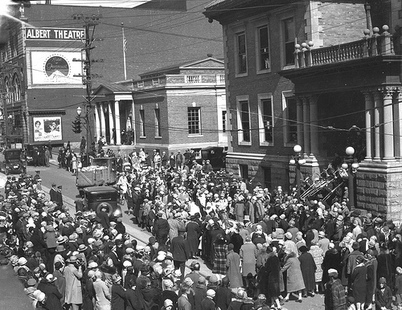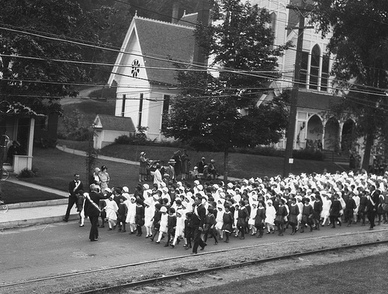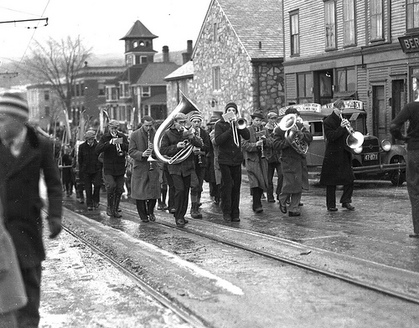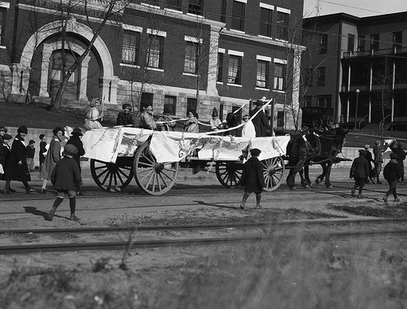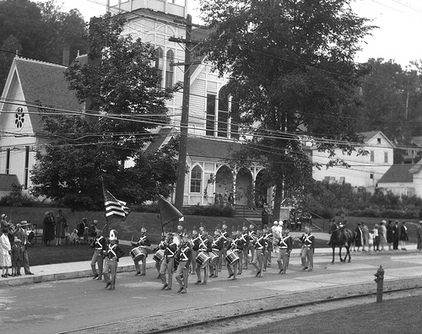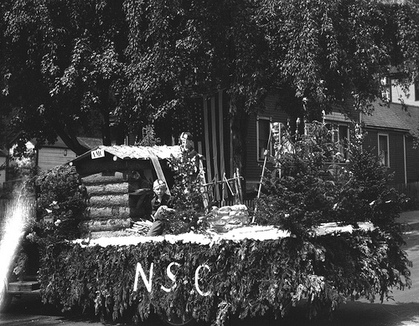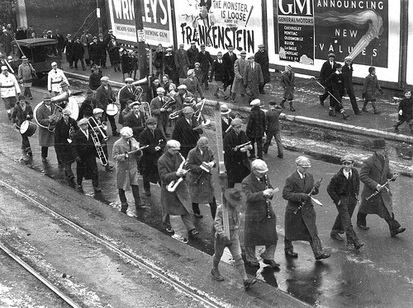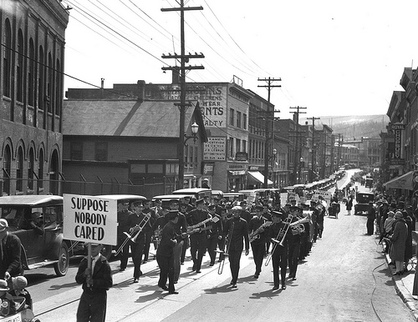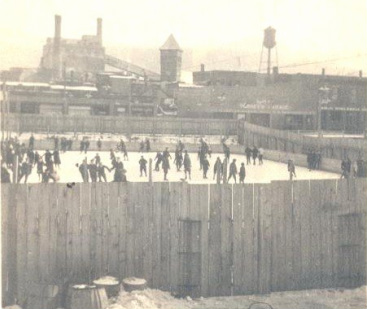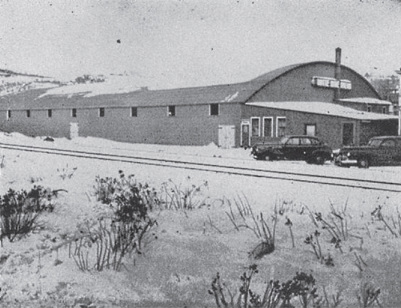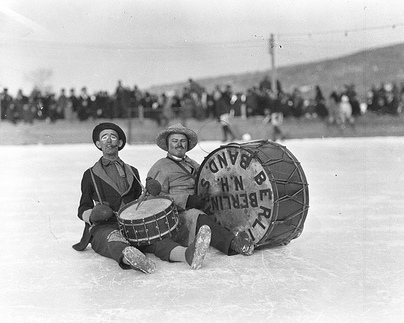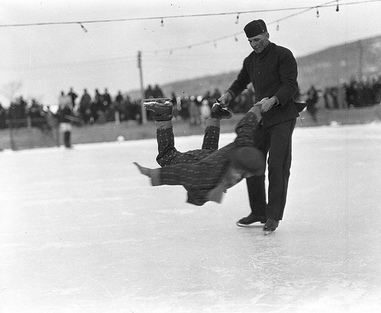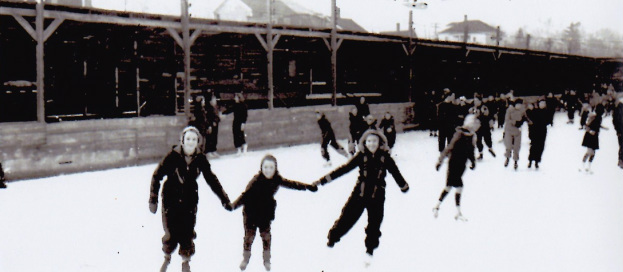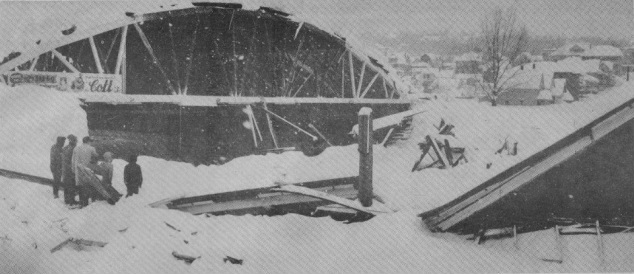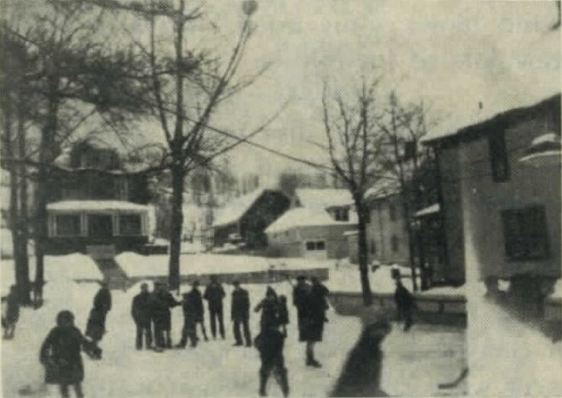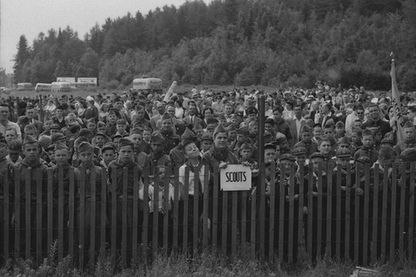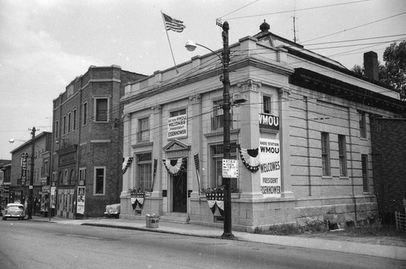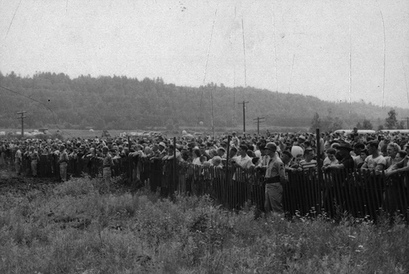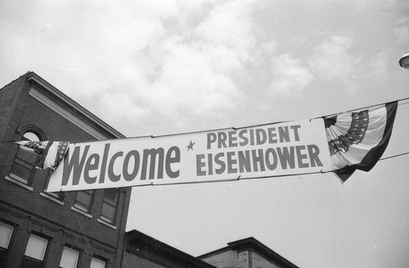Past Events of Berlin New Hampshire
Berlin's One Hundredth Anniversary
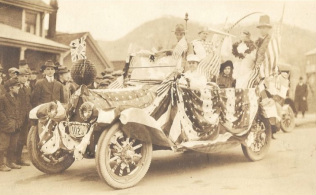
One of the floots
Berlin was incorporated as the town of Berlin in 1829. When Berlin reached it’s one hundred birthday there were huge parties and festivals. Here is a short story of some of the events that took place. The centenary pageant had over one thousand members in its cast, depicting the history of the city from its early beginning to the present day (1929). Miss Berlin, Pauline Sullivan, bid everyone a cordial welcome. This was followed by different scenes, starting with Indian camp life, first settlers, first school, the incorporation of Berlin, Civil War and July 4th, 1876. Many people acted out these events, which closed with the singing of the national anthem, by the entire cast. On the morning of the fourth, there were nearly forty thousand people that lined the streets to view the spectacular centennial parade. It was over two miles long and contained colossal floats, gorgeously decorated cars, and impressive marching bands. The grand prize for the floats was a replica of the Santa Maria with members of characters in costume. This was done by the White Mountain Council, Knights of Columbus. There were many other impressive floats from many different organizations. Sporting events included great baseball games at the YMCA field, with teams from Groveton, Rumford, Lewiston, Laconia, Berlin and Saranac Lake. The night before the fourth, three thousand people witnessed some of Berlin’s best in a thrilling boxing show. The main bout was Felix King of Berlin versus Sig Hoiseth of Montreal. King lost in a decision. Other Berlin pugilists that night, were Johnny Leroux and Mike Goyette. Woodsman sports took place along the river in the Berlin Mills section above what is now the walking bridge. Participants in these events were woodsmen from the Connecticut Valley competing against their counterparts from the Androscoggin Valley. The first event was a tree-chopping contest. Four sixteen-inch logs, each thirty feet tall, were set firmly into the ground at the corners of a square. The winner was Carl Gosselin of the Androscoggin Valley, who felled his tree and cut it in two in six minutes and thirty seconds. Second prize went to Joseph Doyon of the Connecticut Valley. Log rolling contest between Dan Bosse and Perley Hurd, both of whom were log-driving legends never materialized. Unfortunately they both liked to tip the bottle while they were not on log drives. Fred Landry ended up representing the Androscoggin valley and won the contest. Tommy Graham won the log race from shore to boom pier and back again. He represented the Connecticut Valley and was sixty-five years of age. The Mardi Gras held on Main Street, was also a big feature. It included 15,000 people and took place between Mason Street and Green Square. Old time melodies accompanied by harmonicas, accordions, banjos and various other instruments, filled the air. There was even an aviation show along with a military anti-aircraft display, which was held at the YMCA field. A great exhibit of antiques was also on display at the public library. There is a great picture of this display in an old Brown Bulletin. The Governor’s Ball, Centennial Ball, and Military Ball were all held at the state armory (Rec. Center). All of these events were a huge success. There were even parachute drops and balloon ascensions. The celebration of Berlin’s 100th anniversary was a huge success. Much credit was due to the numerous committees for their time and effort in arranging and putting together the biggest celebration ever held in the North Country.
The Winter Carnival
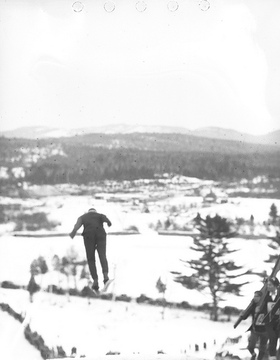
(Image from Beyond Brown Paper archives)
The Winter Carnival was first held in the Norwegian Village because of the Paine Hill Ski Jump that was built for the first winter carnival. Many fun games were played on the frozen Androscoggin River. People would compete in many activities like Barrel rolling. The last winter ended a wonderful era in Berlin’s history.
Cornerstone laying of the YMCA (Community Club)
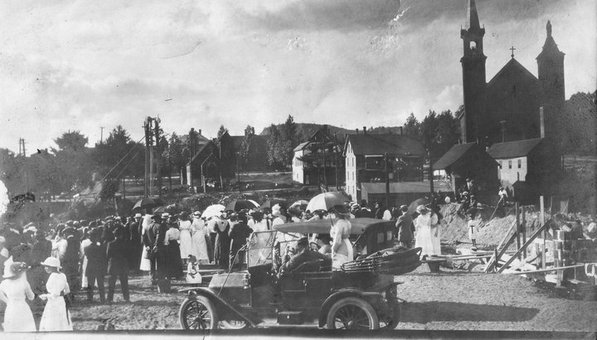
(Image from Poof Tardiff)
The laying of the cornerstone of the building that would later be the known as the Community Club took place on August 31, 1913 at 3:00pm. Orton B. Brown but a metal box that contained 12 things, a story of the life and service of the late W.W. Brown of Portland, Maine, a photograph of Mr. Brown, current coins of the country, a copy of the act of the legislature of 1913, creating the YMCA, of the Berlin Reporter of March 18 and March 20, 1913, memorandums of parties to the contract for erecting the building, the officials of the YMCA and Gilbert Brothers, contractors and date of the contract, the program of exercises at the laying of the cornerstone, sketch of Mayor Daley’s address. The ceremony closed with the singing of “America” by the entire congregation. In May of 1914, a great dedication and grand opening took place and on May 25, 1914 the YMCA building was opened for the first time. No one knows what every happened to the cornerstone box.
The Boy Scout Camp on Main Street
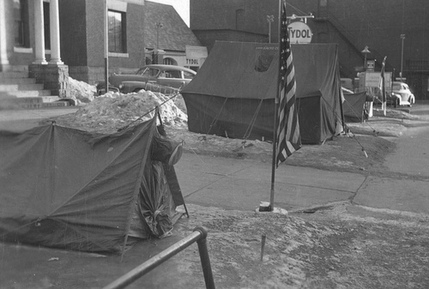
(Image from Beyond Brown Paper archives)
The Boy Scout camp on was not an everyday thing but it happen once or twice, maybe more. First the Boy Scouts would go to the parking lot of the courthouse and set up camp. They would do things like cook their dinner and tell jokes. The Boy Scouts did a lot of things for the community and they still do.
Cornerstone laying of the City Hall
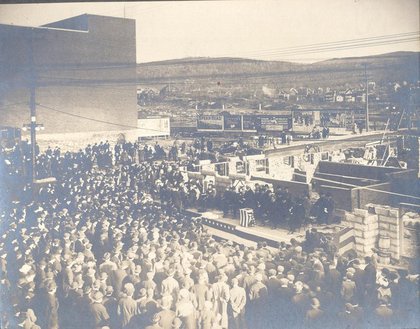
(Image from Poof Tardiff)
Cornerstone laying of the of the City Hall took place on November 16, 1913. Berlin’s new City Hall was built by the Gilbert Brothers and replaced the city building that once stood on Mechanic Street. Mayor Daniel Daley wanted to but a city building closer to the stores on Main Street. City Hall was finally completed and opened to the public on November 23, 1914 and at this time practically the whole population of Berlin went through the building. The cost for construction was $77,825.00. City Hall still stands on Main Street and still operates.
The Circus
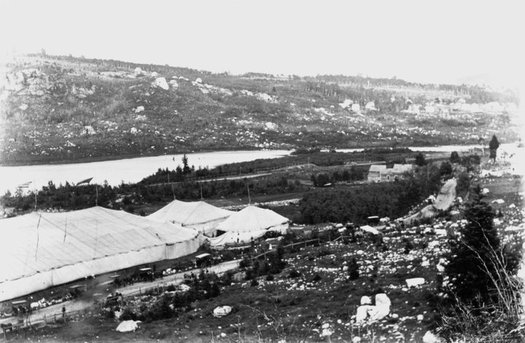
The Forepaugh & Sells Brothers circus at Mason's Field
In the early years, the Circus was held at Mason’s Field on the Jericho Road. This is in the same area as today’s PWD. Forepaugh & Sells Brothers circus arrived here from Sherbrooke, Quebec and the work of transporting the paraphernalia to Mason’s Field was performed in time for the usual street parade at about 11 am. Many visitors were in town for the day and the streets along the route were lined with onlookers. Hack and carriage men, which can be seen in the old picture on the left, did a lively business during the afternoon and evening transporting circus goers to the scene of attractions and by the hour of opening, the large tent was well filled up. In fact, one of the largest crowds ever seen at a circus in this city up to this time was there, with a number being put at five thousand spectators. The feature of this one day circus was the daring feats of two bicyclists called Diavlo, doing the loop to loop and Prodigious Porthos in his hair-raising chasm vaulting act. Many other events were held at Mason Field in these days to include baseball games. In later years the circuses were held at the YMCA Field and Horne Field.
Parades
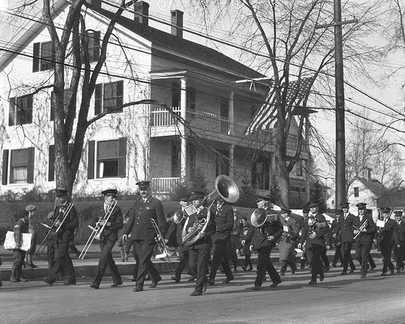
(Image from Beyond Brown Paper archives)
Parades played a big part in Berlin’s social life. We had many of events were we used floats and non-float parades, like marching bands. Parades still continue to happen in the streets of Berlin New Hampshire.
Winter Sports
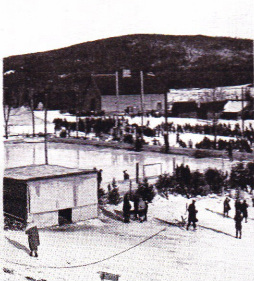
Paine's Rink in the early 1920's
Many people participated in winter sports here in Berlin. Ice hockey was very popular and at one time we were known as “Hockey Town USA”. Hockey was first played in northern New Hampshire than Berlin was the City that introduced it to the rest of the country. One of Berlin’s ice rinks was called Paine’s Rink. It was situated just below the Paine Hill ski jump on a spot that is on the corner of Twelfth Street and Norway Street and a section between Nansen Street and Norway Street. This rink hosted hockey games, skating, barrel jumping and more ice events during the early Winter Carnivals. Another rink was called the Pleasant Street rink. It was originally Mr. St. Laurent who started a skating rink on Green’s Pond. When the Berlin Hockey Association got started, many of their great games against Canadian teams were played here and watched by hundreds of spectators. There was also ice skating events during both day and night that involved many of Berlin’s citizens. This rink stood almost on the same spot as the Coos County Family Health Center does today. Yet another rink stood on the same spot as today’s Notre Dame Arena, which was called the Coulombe rink. We had many smaller skating rinks in Berlin. Winter carnivals were also very popular in Berlin as well.(Image from Poof Tardiff)
President Eisenhower's visit
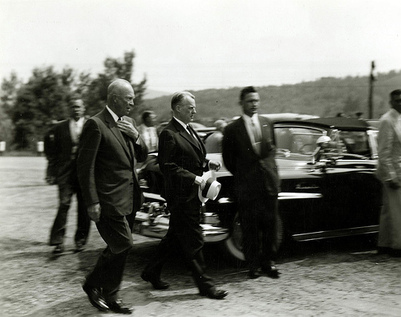
President Dwight D. Eisenhower in Berlin (Image from Beyond Brown Paper archives)
President Dwight D. Eisenhower came to Berlin in 1955. Hundreds of people from all over gathered at the Nansen Ski Jump to hear the President’s speech.
President Eisenhower said “Chairman Halvorson" (Alf Halvorson) "distinguished guests, ladies and gentlemen: I am sure you realize that a loudspeaker system and a position on this platform to speak into the microphone is a poor substitute for what I should really like to do: to go through this throng and to meet each of you, to tell you something of how I feel about this visit to New Hampshire. I have been traveling through this lovely State for two days. Everywhere I have encountered an obvious hospitality and a cordial welcome that have touched my heart. I have seen your beautiful skies, your lofty mountains, your great dairy herds, and many of your other industries. It has been, for me, a tour of real education. I have been accompanied by your State officials, and everywhere local committees have participated in ceremonies and arrangements that have made my trip all the more enjoyable. Particularly am I indebted to Governor Dwinell and his family, to Senator Bridges, to Senator Cotton, to Congressman Merrow and Congressman Bass and their lovely wives. All of them have been giving of their time to make my visit the more instructive, the more interesting and the more enjoyable. In fact, they are busy men, you know, and I am quite sure that they are rather glad that this meeting marks the sort of official termination of my visit in New Hampshire; because out of their sense of friendship and loyalty they are staying with me, and possibly they realize their desks are piling high with work back in Washington and back in Concord. This particular visit this morning has been sort of a climax for all of us. I have accumulated so many gifts that I am moved to remind the chairman there is a very important one he forgot. He should have provided a truck to carry them away. But there seem to be enough cars in this cavalcade that I think we can tuck them in here and there and nothing will be left behind, I assure you. Now, my friends, I just want to say this: never have I had a more pleasant time than I have had on these two days. It has been a unique experience to come up in these northern sections of your State, to see you people, to learn something of the countryside, and to have the chance to greet some of you face to face. And I would like, as I leave this State, to transmit a message through you to every citizen that I can reach who has greeted me along the roadside, who has been in one of the crowds that has extended to me such a cordial welcome: I am grateful--deeply grateful. And I tell you this: I am going to accept that invitation to come back, just as soon as possible--which means certainly as soon as I have another kind of livelihood than I now enjoy. And I want to warn the Democratic Mayor of Berlin that the next time I come I am not going to be kept out of the city. I am going right down the middle of it; and the only way he can stop it will be to turn out the police force, because at that time I will not be accompanied by so many police of my own. Thank you, ladies and gentlemen--each of you--for coming out this morning, to give me a chance to say to you "thank you," and to greet you in this fashion. It has been a wonderful morning for me. Thank you again."
President Eisenhower said “Chairman Halvorson" (Alf Halvorson) "distinguished guests, ladies and gentlemen: I am sure you realize that a loudspeaker system and a position on this platform to speak into the microphone is a poor substitute for what I should really like to do: to go through this throng and to meet each of you, to tell you something of how I feel about this visit to New Hampshire. I have been traveling through this lovely State for two days. Everywhere I have encountered an obvious hospitality and a cordial welcome that have touched my heart. I have seen your beautiful skies, your lofty mountains, your great dairy herds, and many of your other industries. It has been, for me, a tour of real education. I have been accompanied by your State officials, and everywhere local committees have participated in ceremonies and arrangements that have made my trip all the more enjoyable. Particularly am I indebted to Governor Dwinell and his family, to Senator Bridges, to Senator Cotton, to Congressman Merrow and Congressman Bass and their lovely wives. All of them have been giving of their time to make my visit the more instructive, the more interesting and the more enjoyable. In fact, they are busy men, you know, and I am quite sure that they are rather glad that this meeting marks the sort of official termination of my visit in New Hampshire; because out of their sense of friendship and loyalty they are staying with me, and possibly they realize their desks are piling high with work back in Washington and back in Concord. This particular visit this morning has been sort of a climax for all of us. I have accumulated so many gifts that I am moved to remind the chairman there is a very important one he forgot. He should have provided a truck to carry them away. But there seem to be enough cars in this cavalcade that I think we can tuck them in here and there and nothing will be left behind, I assure you. Now, my friends, I just want to say this: never have I had a more pleasant time than I have had on these two days. It has been a unique experience to come up in these northern sections of your State, to see you people, to learn something of the countryside, and to have the chance to greet some of you face to face. And I would like, as I leave this State, to transmit a message through you to every citizen that I can reach who has greeted me along the roadside, who has been in one of the crowds that has extended to me such a cordial welcome: I am grateful--deeply grateful. And I tell you this: I am going to accept that invitation to come back, just as soon as possible--which means certainly as soon as I have another kind of livelihood than I now enjoy. And I want to warn the Democratic Mayor of Berlin that the next time I come I am not going to be kept out of the city. I am going right down the middle of it; and the only way he can stop it will be to turn out the police force, because at that time I will not be accompanied by so many police of my own. Thank you, ladies and gentlemen--each of you--for coming out this morning, to give me a chance to say to you "thank you," and to greet you in this fashion. It has been a wonderful morning for me. Thank you again."
|
|
|
The Taft Visit
On January 8, 1920, William H. Taft, who was president from 1909-1913, came to Berlin and spoke at the Albert Theater. His speech lasted one hour and thirty five minutes and was about “The League of Nations”. In 1921, we also got a visit by President Harding.
The Burgess Wood-Pile Fire
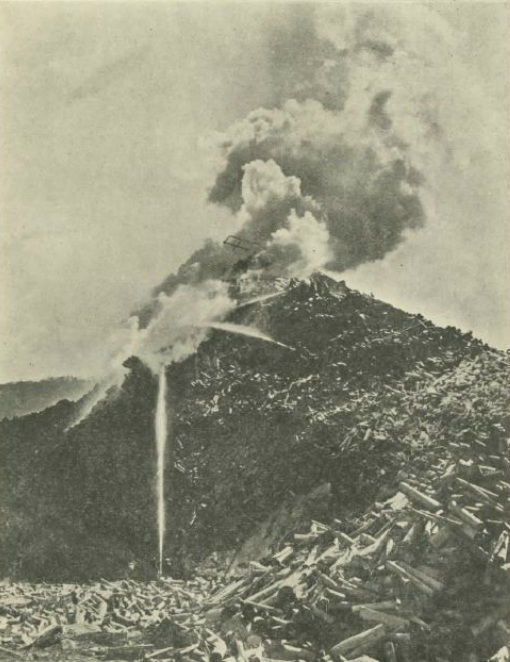
"The ample provisions for fire fighting
made by the Brown Company and by the
City of Berlin were put to a hard test on
the morning of April 12, [1926] when fire with
what seems to have been two hours' start
was discovered high in the large pile of
pulpwood at the Sulphite Mill. It was a
two-alarm fire from the outset. The mill
equipment held the fire until the city
forces arrived with all its pumping equipment.
After two hours' hard fighting by
the combined mill and city forces at a
temperature at which water readily froze,
the fire was brought under control with
relatively small loss. It was a time when
both high pressure and large volumes of
water were required. It is a pleasure to
record that the emergency was met so
efficiently for its outcome reflects credit
both upon those concerned with equipping
the Company and the City and those who
manned the apparatus when the time came
to use it. A picture of the fire taken by
Everett Murray of our Photo Section is
reproduced upon Page 13." ---Brown Bulletin
